Oil prices hit four-year high after Opec defy Trump’s calls for production boost

Oil prices have hit a four-year high after Opec ruled out a production increase and analysts predicted it would continue to rise towards $100 per barrel.
Brent Crude Oil reached $81.17 per barrel, up more than 2 per cent, on Monday – its highest since 2014 – after Saudi Arabia and Russia led the way in defying Donald Trump's calls for a production boost.
Commodities trackers Trafigura and Mercuria predicted prices could rise towards $100 per barrel by the end of the year or in early 2019.
Read more: Trump slams Opec, urging oil cartel to 'get prices down now'
Speaking at the Asia Pacific Petroleum Conference (APPEC), Mercuria president Daniel Jaeggi, said around 2 million barrel per day or crude could be lost due to US sanctions on Iran.
He said: “We are on the verge of some significant volatility in Q4 2018 because depending on the severity and duration of the Iranian sanctions, the market simply does not have an adequate supply response for a 2 million barrel a day disappearance of oil from the markets.”
Trafigura's co-head of oil trading, Ben Luckock, told the conference, in Singapore, Brent could rise to $90 per barrel by Christmas and hit the $100 mark in the new year.
Mihir Kapadia, of Sun Global Investments, said: "With Brent crude already above $80.50 per barrel, we can expect the oil markets to close at early $90s by the end of the year and touch $100s by March 2019.
"This is of course dependent on OPEC continuing its commitment with the production limitation strategy until then…The OPEC meeting on 3rd December will set the agenda for the next year’s price mark."
While Naeem Aslam, from Think Markets, said Brent would continue its current rally and touch $90 per barrel.
The sanctions against Iran's oil sector are set to begin on 4 November and Opec and non-Opec oil producers ruled out an immediate production hike to counter falling supply.
Opec's leader Saudi Arabia moved to calm fears that oil prices would continue to rise.
Saudi energy minister Khalid al-Falih said he did “not influence prices” and that increased oil output wasn't necessary, at a meeting in Algeria on Sunday.
He said: “My information is that the markets are adequately supplied.
“I don't know any refiner in the world who is look for oil and is not able to get it.”
Russian energy minister Alexander Novak also said no immediate output increase was necessary.
Read more: US sends messages to Iran 'every day' in bid to open negotiations
But he said the trade war between China and the US as well as Trump's sanctions on Iran were creating new challenges for oil markets.
Earlier this week Trump criticised Opec, urging the oil cartel to “get prices down now.”
He said: “We protect the countries of the Middle East, they would not be safe for very long without us, and yet they continue to push for higher and higher oil prices.
“We will remember. The Opec monopoly must get prices down now.”